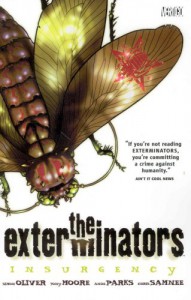1
Followers
23
Following
Inside a Dog
"Outside of a dog, a book is a man's best friend. Inside of a dog it's too dark to read."
A Drifting Life
 I expected more from this, having been a huge fan of the author's collections of shorter pieces like "Abandon the Old in Tokyo." Here, each chapter is about the length of those shorter stories but the narrative often lacks any kind of energy.
I expected more from this, having been a huge fan of the author's collections of shorter pieces like "Abandon the Old in Tokyo." Here, each chapter is about the length of those shorter stories but the narrative often lacks any kind of energy. Ach, will the hero publish with this manga house or that one? Well, a couple chapters of these kinds of dilemmas go a long way, but Tatsumi spends more than the necessary time in his 800ish pages putting his thinly veiled autobiographical stand-in through this scenario. That can be exciting to live and a compelling formative experience but nothing really seems to grow out if that. By the 700 page range, the hero, Katsumi (verrrry thinly veiled), is still having these same struggles and it's rather dull to hear about them yet again.
Worse still, in a gigantic tome dealing with manga history from one of those history makers, I wanted to see a lot more of the samples of the kind of manga being put out, both by the hero and his contemporaries. How are we supposed to sincerely get a sense of how Tatsumi's groundbreaking work broke ground if we can't see lots of it and how it changed and what it was up against? We see a lot of covers and some small samples, but it all feels so cursory.
We follow the hero from teenage years to middle-age and he's a decent enough sort, his physicality a mirror of Tatsumi's sad sack protagonists in his other manga titles. His friends are a lively crew and save for his manga wring brother his family are nearly non-entities. There's some good stuff with his ne'er do well father but unfortunately (for me) not enough. This is a manga history primarily, not an autobiography per se, so rapscallion parents who aren't big manga names get the short end of the inkbrush, so to speak.
The stories are neatly paced and devoid of the slapsticky elements most people associate with manga, perhaps Tatsumi's most lasting contribution to Japanese comics. The concerns are everyday ones, which is where the author's strength really lies despite his dreams of crafting an epic. This certainly isn't it, though it does possess the physical heft of an epic.
A Song of Ice and Fire
 I'm not a huge fantasy fan but this series has me hooked. After hearing all the accolades for the show I thought I'd check out the novels. I expected something along what I dislike about most fantasy, a kind of high serious comic book mentality with buxom barely clad ladies and muscle-rippled swordsmen, long-bearded wizards with runestones and ludicrous spells, fantastical creatures that defy a naturalistic universe, and all manner of juvenile silliness. You know, pulpy genre writing.
I'm not a huge fantasy fan but this series has me hooked. After hearing all the accolades for the show I thought I'd check out the novels. I expected something along what I dislike about most fantasy, a kind of high serious comic book mentality with buxom barely clad ladies and muscle-rippled swordsmen, long-bearded wizards with runestones and ludicrous spells, fantastical creatures that defy a naturalistic universe, and all manner of juvenile silliness. You know, pulpy genre writing.Instead, Martin has crafted a really well thought out alternate world with some wisps of the fantastical, but mostly it is a tale of dynastic grudges, political maneuvering, and palace intrigues. The characters are interesting (especially the dwarf Tyrion), the plotting is complex (there are factions within factions within factions), and the canvas is broad.
It's somewhere in the space of 4,000 pages, so it's clearly a long-haul, but Martin keeps it from ever being a slog.
Operation Mincemeat: How a Dead Man and a Bizarre Plan Fooled the Nazis and Assured an Allied Victory
The Orange Eats Creeps
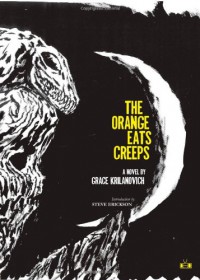 Comment, not review: I'm not sure I'm liking this early on and I've kinda run out of steam but the language is intense, hypnotic, hallucinatory, disjointed. Imagine Burroughs in his most addicted time now writing as a meth addicted teenage girl runaway and you start to get the shape.
Comment, not review: I'm not sure I'm liking this early on and I've kinda run out of steam but the language is intense, hypnotic, hallucinatory, disjointed. Imagine Burroughs in his most addicted time now writing as a meth addicted teenage girl runaway and you start to get the shape. I stalled on reading this, wanting to like it more than I did so far, and, frankly, it's very unusual for me not to plow through a book to its bitter end, regardless of the effort or chorefulness of the task.
On the whole, some very lovely language throughout, some episodic nightmarishness, but a grueling disconnectedness and a wandering thread that kept me from returning after many multiple-day lulls.
That's no way to read a book. Could I have read it cover to cover if laid up in traction in some idyllic Swiss chalet? Quite possibly. Can I read it betwixt papers and grading and childcare and every other time press on me now? Quite honestly, no. Not today.
Mind you, if you have longer reading times and a stronger ability at piercing this book's veil of delirium, your mileage may infinitely vary.
Mockingjay
 Just started this third book in the trilogy after the killer cliffhanger at the end of Catching Fire. The wife has plowed through the first two books in about 2.5 days. On my recommendation, I might add. (It's pleasant to so well nail someone's tastes...)
Just started this third book in the trilogy after the killer cliffhanger at the end of Catching Fire. The wife has plowed through the first two books in about 2.5 days. On my recommendation, I might add. (It's pleasant to so well nail someone's tastes...)Still waiting to wrap up the third book before summing it all up, but needless to say I have enjoyed all three too immensely to give an objective review just this soon.
The Unsinkable Walker Bean
 I'd never heard of this until I got it for Christmas. My wife bought it for me on the good word of Jeff Smith, the author of the Bone series, and he wasn't lying. It's been a hoot so far.
I'd never heard of this until I got it for Christmas. My wife bought it for me on the good word of Jeff Smith, the author of the Bone series, and he wasn't lying. It's been a hoot so far.
Catching Fire
 Where the first book was more action, its sequel has turned a bit more introspective. The plot is shaping up to get much more action-packed, but the narrator's self-loathing, her survivor's guilt make the slow burn toward climax compelling.
Where the first book was more action, its sequel has turned a bit more introspective. The plot is shaping up to get much more action-packed, but the narrator's self-loathing, her survivor's guilt make the slow burn toward climax compelling.
Raising Your Spirited Child Rev Ed: A Guide for Parents Whose Child Is More Intense, Sensitive, Perceptive, Persistent, and Energetic
 This book, a parenting help book is actually making me laugh so hard I feel like crying. If you'd ever meet my daughter you would certainly understand.
This book, a parenting help book is actually making me laugh so hard I feel like crying. If you'd ever meet my daughter you would certainly understand. Not sure I'll ever finish reading this, so perhaps a special shelf for books that offer constant solace and advice.
The Hunger Games
 Had to see what all the hype was about, and for the moment, I'm rather enjoying it. Not earth-shattering literature but a fine gripping read at this point.
Had to see what all the hype was about, and for the moment, I'm rather enjoying it. Not earth-shattering literature but a fine gripping read at this point.On to the second book and perhaps a trilogy review when I'm finished.
Mr. Peanut
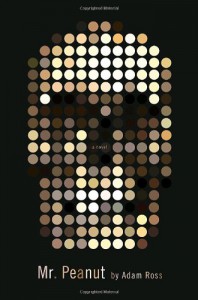 This book started off for me scorching hot:
This book started off for me scorching hot:"When David Pepin first dreamed of killing his wife, he didn't kill her himself. He dreamed convenient acts of God. At a picnic on the beach, a storm front moved in. David and Alice collected their chairs, blankets, and booze, and when the lightning flashed, David imagined his wife lit up, skeleton distinctly visible as in a children's cartoon, Alice the collapsing into a smoking pile of ash...Anything could happen between here and there. On the edge of the platform, two boys were roughhousing. The train came barreling into the station. An accidental push. Alice, spun round, did a crazy backstroke before she fell. And it was over.... The things that went through his mind! From their window, he watched Alice walk up the street. A helicopter passed overhead. On Lexington, at the building under construction, a single girder was winched into the sky. And David imagined this was the last time he would ever see his wife -- that this was the last image he'd have of her -- and he felt the sadness well up and had the smallest taste of his loss, like the wish when you're young that your parents would die."
Now, if you tell me that you've been married and you haven't, in times of great frustration thought of your spouse's brakes going out while s/he's on the way to the store or falling down a flight of stairs while you're not home, then I'm going to say, You're a goddamned saint or liar.
And it was that blistering honest fantasizing that was coursing through the book's opening that riveted me to the page. Could he really be writing this? I thought. It felt almost chillingly like a hushed confession.
And then somewhere throughout the course of the book, it lost me. I don't mean to say that I failed to follow the plot or that the book becomes incomprehensible gibberish. I mean that where it felt like the book was going in the beginning was somewhere else from where the book ended up going, and not necessarily in that excitement of discovery way, but rather in a meandering sort of lost-the-thread way. Oh for an editorial Ariadne to give Mr. Ross's Mr. Peanut the key to the labyrinth.
And it's not as if the book didn't have big big ambitions. It couldn't have gotten so spectacularly off-track if it didn't have big ambitions. The plot in a, ahem, nutshell:
We learn that David Pepin, who dreams so vividly of killing his wife, is a vastly successful video game designer who has had great success with worlds crafted after M.C. Escher paintings, worlds that fold back within and out of themselves, and that he is writing a novel. What is his novel about? It is about a man named David Pepin who dreams of killing his wife. After Alice Pepin dies for real, choked to death on a peanut that set off her allergies, detectives arrive to begin the investigation asking, "Did he try to get the peanuts out of her seizing throat or did he force them down her himself?"
There the book sets off into discovering who and what to make of the Pepin marriage. We see their meeting, their courtship, their attempts and failures at having children, and this stuff is utterly fantastic. It is moving, it is vivid and yet still hallucinatory at times. It has the frustrations and the closed offedness of a real relationship, that space that is unknowable to anyone not in the relationship, yet Ross peels it back skillfully for us and shows us how universal it is, if singularly alien.
But then we get on to the detectives and the book veers into something not quite so compelling. We learn of one detective, whose wife goes to bed one day, refusing to get out for months, and this is interesting by itself, a decent short story, though clearly related thematically to the rest of the novel. And the other detective, the partner, is Dr. Sam Sheppard, who has, after being released from prison, moved far away from Ohio to become a police detective. And, yes, that is ambitious, to take a real life historical figure and to run with it, to put that person in some new situations that never happened. And along the way we get the story of the Sheppard marriage, its dissolution, and the eventual murder of Marilyn Reese Sheppard. And the stuff with Sheppard is itself interesting and well written, and I can see what Ross is trying to accomplish here, but these threads don't ever seem to bundle themselves together in any purposeful way. They are there, they want to be related, and despite characters and themes that should make this all sing, it just doesn't quite get there.
It isn't as if I can't draw the lines that Ross wants the readers to draw here, the parallels, the fascination with a case that remains somewhat "unsolved" in the public mind, the curious behaviors of everyone involved in the Sheppard case, and how it in many ways parallels the Pepin story. It's just that it feels like Ross had a short story and two novels that he wanted to mush together into something larger than itself, and for me that gelling just never happens.
When we return to Pepin's story -- the book tends to hop around considerably in time, in focus, and in between fiction and reality -- the detectives have captured a man they believe to be the assassin hired by Pepin to actually murder his wife, a man with the unfortunate character name of Mobius. This is the point where in reading the book I groaned. Mobius? Seriously? Such overt winking at the reader is the province of too-clever by half sophomore creative writing workshop pieces. And it was so jarring that it was hard to get back into the book with the same level of enthusiasm or interest. Whatever are we to do as readers in such a moment? How can we regain our footing in this fictional world and how can we trust the author to guide us?
I'm not saying such reaching out through the page to nudge a reader can't be pulled off successfully, but it works best in the hands of a skilled ironist, and Ross is no ironist. In fact, at the moment of making that observation in my reading, the seriousness of Ross's prose and story-telling began to weigh heavily on me. The prose that had danced in the book's opening pages, now felt like a chore to read. Sure, some of the Sheppard stuff is interesting, but get back to Pepin's case, get back to your novel's heart.
As I see it, the author wants a book that is a puzzle, he wants it to be flexible and friable, mix and matchable. He wants to chop up his narrative and serve us first this piece then that, the entire meal a welter of tastes, one after the other, confounding our expectations. Yet the book marches directly toward its conclusion and the infinite loop that should appear to us as readers is instead merely a moment where we read Pepin's novel then we read Pepin's reality, then we read Pepin's novel again. It isn't confusing or bewildering or unsettling the way it should be, it merely comes off as authorial exhaustion and trickery in place of magic.
Which is, frankly, a damn shame as this book had magic in its opening that I certainly wanted to believe in.
Fables, Vol. 3: Storybook Love
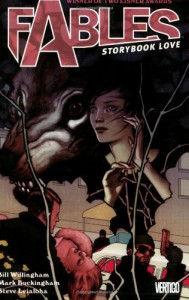 The third volume of this series and I have to keep reminding myself to pace myself or it will all be over too too soon.
The third volume of this series and I have to keep reminding myself to pace myself or it will all be over too too soon.
And Then There Were None
 Confession (I may have said this before): When I was younger, I labored under the delusion that Agatha Christie was some boring shit old people read. I pictured this gray haired ancient lady, like a wispy version of Jessica Fletcher, sitting with multiple cats on her lap as she picked away at her typewriter writing foolish little mysteries.
Confession (I may have said this before): When I was younger, I labored under the delusion that Agatha Christie was some boring shit old people read. I pictured this gray haired ancient lady, like a wispy version of Jessica Fletcher, sitting with multiple cats on her lap as she picked away at her typewriter writing foolish little mysteries. Then on a whim, back when I worked my night shift job and listened to far more audiobooks, had far more time to "read," and was far more willing to take chances on picking up titles at random (freedom can make you brave), I picked up a Christie novel. Murder on the Orient Express. Not a bad choice.
The plotting was tight, the narration was excellent, and I was hooked. I have since listened to scads more Agatha Christie books, but the funny thing is, I never really sat down with one in my hand and read the thing. My wife and I may go extra rounds after the bell over whether or not listening to an audiobook can be considered reading, and I may swear up and down that it is, but my actions have spoken pretty loudly in the past. Things I'd idly put on while painting a fence, cleaning the house, processing criminal background checks, these are, a lot of them, not things I would sit for hours uninterrupted doing. They were diversions, not the great literature that demanded my attention
So, to be quite honest, I haven't read or listened to an Agatha Christie novel in quite some time. With her earlier work moving slowly into the public domain and my shiny new iPad gizmo at hand, I decided I'd begin hunting down various Christie novels. I tend to find some lighter reading to fill the latter two months of the year, a sort of collapse of my habits of typically reading dense Germanic philologists, Olde English texts in the original, and runes, and so comic books and the kinds of things still published in pocket paperbacks fill the wintery time of the year.
Luckily, this novel fell to hand. The provenance of the epub version is of little interest save that in the beginning, I wasn't sure it was legit. The paragraphs seemed so short, the use of exclamation marks seemed a bit promiscuous, the sudden introduction of ten characters in one go confused and alarmed me. Was this the careful and well-plotted novelist I'd come to love
I settled down to reading, though, and eventually made sense of things, going back and forth to reassure myself who all these people were. Oh, for the buttery tenor of David Suchet with his gift for accent and characterization! He'd have sorted out these island vacationers and given me something to grasp. What we have are eight guests, very quickly sketched as they arrive for a vacation on an island purchased by their host, a mysterious Mr. Owen -- eight guests and husband and wife staff for a total of ten.
And through the course of the novel, Ms. Christie will bump off every last one of these blighters through various means, roughly following the course laid out in the classic (and hideously racist) nursery rhyme. Rather quickly on arriving, after their first meal, the ten hear a phonograph played which accuses each of the island visitors of being a participant in more or less murder. I say more or less because in each case the circumstances would have proved difficult to prosecute: a weak child heir is encouraged to swim out too far, medicine isn't retrieved in time, scornful righteousness leads to suicide, and so on
It seems our guests have been invited to the isolated island under false pretenses, their host having justice in mind, not law but justice. Almost immediately after the record, the first victim falls. We progress from there. What becomes the challenge in such a novel is how to keep the murderer off screen, how to misdirect the reader. As a reader you can choose one of two tacks, it seems.
You can puzzle your puzzler until it grows sore trying to match wits with Dame Christie, and most certainly lose (the tack I take despite my awareness of how I fail as a detective). Or you can simply relax and let the ingenious plot unwind (the tack of a friend of mine). The trick of the first tack to take in this case is that suspects are rather decisively eliminated as the book progresses and you are forced to re-evaluate what you've read previously. At first all the islanders believe that they are hunted by someone external to their party; in time, they come to see the murderer is one of them.
No one seems likely to be the murderer, all of the guests seem likely to be the murderer, and by the book's end I still found myself certain that there had to be a hidden hidey hole for the murderer who would turn up in the book as our fifth-act malefactor. Christie makes good use of her motley characters to keep the plot lively and moving briskly along. Power blocs form and collapse, partnerships are riddled with suspicion, and no one can be relied on, either through confronting their own demons or their sudden death.
It seems when you read a mystery that you do not look to see the author tackle character development, great themes touching on the difficulty of human existence, or social injustices to be addressed. You seek a book that is as distracting an entertainment as any action thriller, but you also seek a puzzle constructed in such a fashion as to tax your mental capabilities.
In this way, it turns out, that mysteries are exactly the kind of escapist fiction I should have been reading all along during my youth when vampires, accursed houses, and other things that go bump in the night claimed my attention. While a ripping good werewolf story might have kept me up all night, first reading, then listening to every creak of an old house settling, a murdered banker with nine decent suspects in his killing would have itched a very specific part of my brain long earlier.
Turns out Agatha Christie isn't for the old fogeys after all. If only I hadn't waited until I was almost an old fogey to find out.
The Exterminators, Vol. 1: Bug Brothers
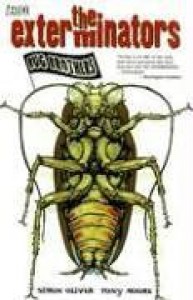 A great big slab of messed up fun. Twists on almost every page, sharp social commentary, gross out over-the-topness, and hilariousness tossed on top.
A great big slab of messed up fun. Twists on almost every page, sharp social commentary, gross out over-the-topness, and hilariousness tossed on top.
Fables, Vol. 1: Legends in Exile
 This is very Gaiman-esque in its attempts at creating a fully edged world from fairy tales and legends and tall tales and elements of mythology. Addictive. I dashed through this first volume in something like two hours without break. Wonderful stuff.
This is very Gaiman-esque in its attempts at creating a fully edged world from fairy tales and legends and tall tales and elements of mythology. Addictive. I dashed through this first volume in something like two hours without break. Wonderful stuff.
Then We Came to the End
 The voice of this novel is what will catch you. Conversational, confessional, scattershot in the best possible way, it's life at an advertising agency once the economy goes bust and layoffs begin. Told in plural first person, there's no protagonist, per se, just this office of screw ups, eccentrics, jerk offs, strivers, earnest types, and all the usual suspects you meet in a business office.
The voice of this novel is what will catch you. Conversational, confessional, scattershot in the best possible way, it's life at an advertising agency once the economy goes bust and layoffs begin. Told in plural first person, there's no protagonist, per se, just this office of screw ups, eccentrics, jerk offs, strivers, earnest types, and all the usual suspects you meet in a business office. Having just been through an ad agency on it's last legs, I can say this novel is pitch-perfect as the good times all run away while life continues to plod drearily, inevitably downwards.
------
Finished this some time ago, but have been too busy to update much here. Altogether excellent. Even up to the last words, Ferris keeps up the impersonal "we" of the narration, and the novel, while having some melodramatic, novelistic elements certainly got the environment of ad agency pitch perfect.






